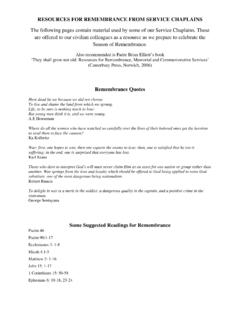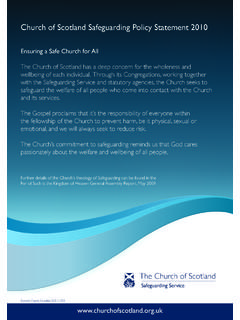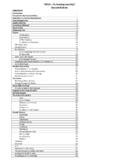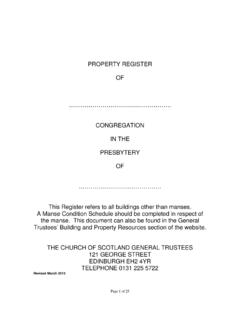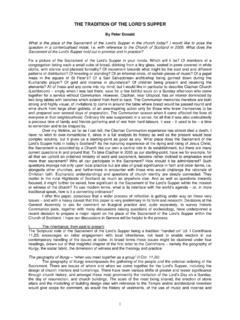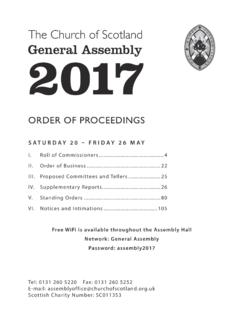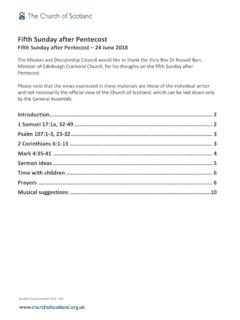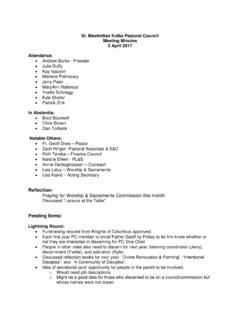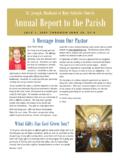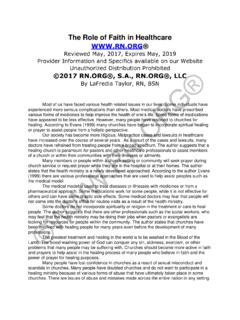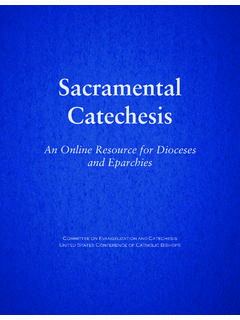Transcription of V. CONSOLIDATING ACT ANENT THE SACRAMENTS (AS …
1 V. CONSOLIDATING ACT ANENT THE SACRAMENTS (AS AMENDED BY. ACT IX 2003). Edinburgh, 20th May 2000, Session 1. (incorporating Acts XXI 1956, XVII 1963, IV 1975, III 1985 and XV 1992). The General Assembly enact and ordain as follows: . Administration of the SACRAMENTS 1. The SACRAMENTS of the Church may be administered only by the following persons: . (1) a person who has the status of a minister of the Church of Scotland and who (a) has been ordained by a Presbytery of the Church of Scotland; or (b) has been inducted to a charge of the Church of Scotland; or (c) has been admitted by the General Assembly as a minister of the Church of Scotland;. (2) a person who has the status of an ordained minister of the United Reformed Church in England and Wales or any Presbyterian Church in Great Britain or elsewhere, whose Constitution is in agreement with the doctrine and practice of the Church of Scotland and who has been duly authorised to administer the SACRAMENTS by the Presbytery of the bounds.
2 Such authority may be given only in special circumstances ( locum tenens, exchange minister) of which the Presbytery shall be the sole judge. (3) a person who has the status of an ordained minister of one of the Lutheran and Reformed Churches in Europe along with Union Churches which grew out of them, and the related pre-Reformation Churches, the Waldensian Church and the Church of the Czech Brethren, and who has been duly authorised to administer the SACRAMENTS by the Presbytery of the bounds; such authority may be given only in special circumstances ( locum tenens, exchange minister) of which the Presbytery shall be the sole judge;. (4) a person who has the status of an ordained minister of a non-Presbyterian Church who has obtained a certificate issued on the authority of the Ministries Council to the effect that his or her ordination is in accordance with the standards of the Church of Scotland, and who has been duly authorised to administer the SACRAMENTS by the Presbytery of the bounds.
3 Such authority may be given only in special circumstances ( locum tenens, exchange minister) of which the Presbytery shall be the sole judge. 2. Notwithstanding the foregoing provisions, ministers of the Church of Scotland may occasionally invite ministers of other Churches whose orders are in accordance with the standards of the Church of Scotland to administer the SACRAMENTS . Any minister whose invitation to a minister of another Church in terms of this section has been accepted shall intimate the same in writing to the Clerk of Presbytery within fourteen days thereafter Administration of Baptism 3. Baptism signifies the action and love of God in Christ, through the Holy Spirit, and is a seal upon the gift of grace and the response of faith.
4 (a) Baptism shall be administered in the name of the Father and of the Son and of the Holy Spirit, with water, by sprinkling, pouring, or immersion. (b) Baptism shall be administered to a person only once. 4. Baptism may be administered to a person upon profession of faith. (a) The minister and Kirk Session shall judge whether the person is of sufficient maturity to make personal profession of faith, where necessary in consultation with the parent(s) or legal guardian(s). (b) Baptism may be administered only after the person has received such instruction in its meaning as the minister and Kirk Session consider necessary, according to such basis of instruction as may be authorised by the General Assembly.
5 (c) In cases of uncertainty as to whether a person has been baptised or validly baptised, baptism shall be administered conditionally. 5. Baptism may be administered to a person with learning difficulties who makes an appropriate profession of faith, where the minister and Kirk Session are satisfied that the person shall be nurtured within the life and worship of the Church. 6. Baptism may be administered to a child: (a) where at least one parent, or other family member (with parental consent), having been baptised and being on the communion roll of the congregation, will undertake the Christian upbringing of the child;. (b) where at least one parent, or other family member (with parental consent), having been baptised but not on the communion roll of the congregation, satisfies the minister and Kirk Session that he or she is an adherent of the congregation and will undertake the Christian upbringing of the child.
6 (c) where at least one parent, or other family member (with parental consent), having been baptised, professes the Christian faith, undertakes to ensure that the child grows up in the life and worship of the Church and expresses the desire to seek admission to the communion roll of the congregation;. (d) where the child is under legal guardianship, and the minister and Kirk Session are satisfied that the child shall be nurtured within the life and worship of the congregation;. and, in each of the above cases, only after the parent(s), or other family member, has received such instruction in its meaning as the minister and Kirk Session consider necessary, according to such basis of instruction as may be authorised by the General Assembly.
7 7. Baptism shall normally be administered during the public worship of the congregation in which the person makes profession of faith, or of which the parent or other family member is on the communion roll, or is an adherent. In exceptional circumstances, baptism may be administered elsewhere ( at home, in hospital). Further, a minister may administer baptism to a person resident outwith the minister's parish, and who is not otherwise connected with the congregation, only with the consent of the minister of the parish in which the person would normally reside, or of the Presbytery. 8. In all cases, an entry shall be made in the Kirk Session's Baptismal Register and a Certificate of Baptism given by the minister.
8 Where baptism is administered in a chaplaincy context, it shall be recorded in the Baptismal Register there and, where possible, reported to the minister of the parish in which the person resides. 9. Baptism shall normally be administered by an ordained minister. In situations of emergency (a) a minister may, exceptionally, and notwithstanding the preceding provisions of the Act, respond to a request for baptism in accordance with his or her pastoral judgement, and (b) baptism may be validly administered by a person who is not ordained, always providing that it is administered in the name of the Father and of the Son and of the Holy Spirit, with water. In every occurrence of the latter case, of which a minister or chaplain becomes aware, an entry shall be made in the appropriate Baptismal Register and where possible reported to the Clerk of the Presbytery within which the baptism was administered.
9 10. Each Presbytery shall form, or designate, a committee to which reference may be made in cases where there is a dispute as to the interpretation of this Act. Without the consent of the Presbytery, no minister may administer baptism in a case where to his or her knowledge another minister has declined to do so. 11. The Church of Scotland, as part of the Universal Church, affirms the validity of the sacrament of baptism administered in the name of the Father and of the Son and of the Holy Spirit, with water, in accordance with the discipline of other members of the Universal Church. Admission to the Lord's Table 12. The Lord's Table is open to any baptised person who loves the Lord and responds in faith to the invitation "Take, eat".
10 13. In accordance with the law and practice of this Church a Kirk Session is obliged to test the response in faith of a baptised person before authorising admission to the Lord's Table. The Kirk Session requires to be satisfied that the baptised person has received instruction in the faith and order of the Church, is of Christian character and is ready to make public profession of faith, whereupon such person is admitted to the Lord's Table and his or her name is added to the Communion Roll of the congregation. 14. Notwithstanding the terms of Section 13 above there is nothing in the law of the Church which would automatically disqualify a person with learning difficulties from admission to the Lord's Table and from having his or her name added to the Communion Roll of a congregation.

